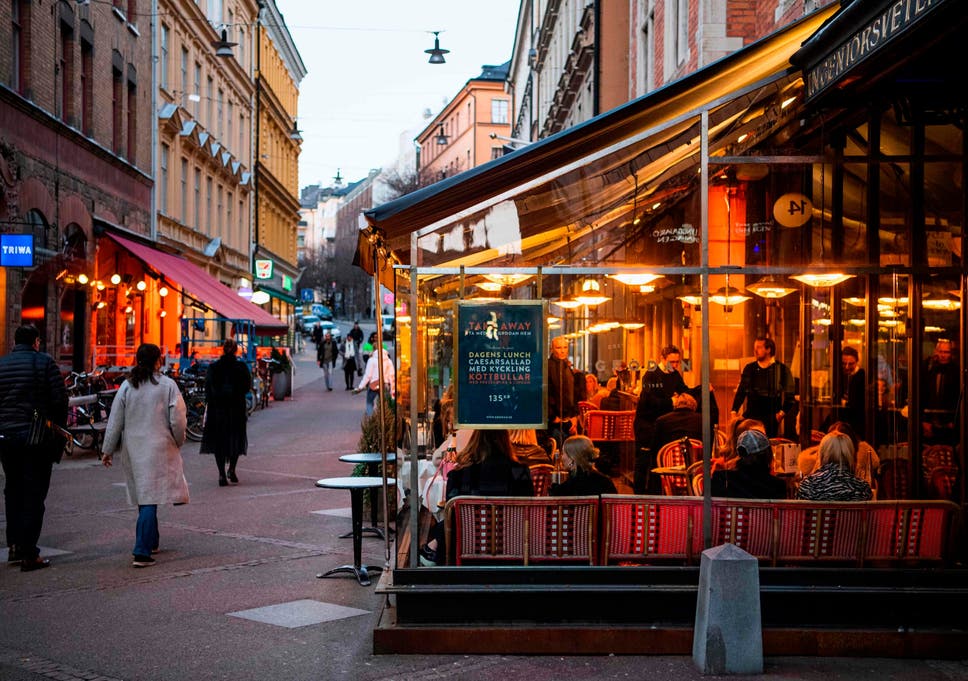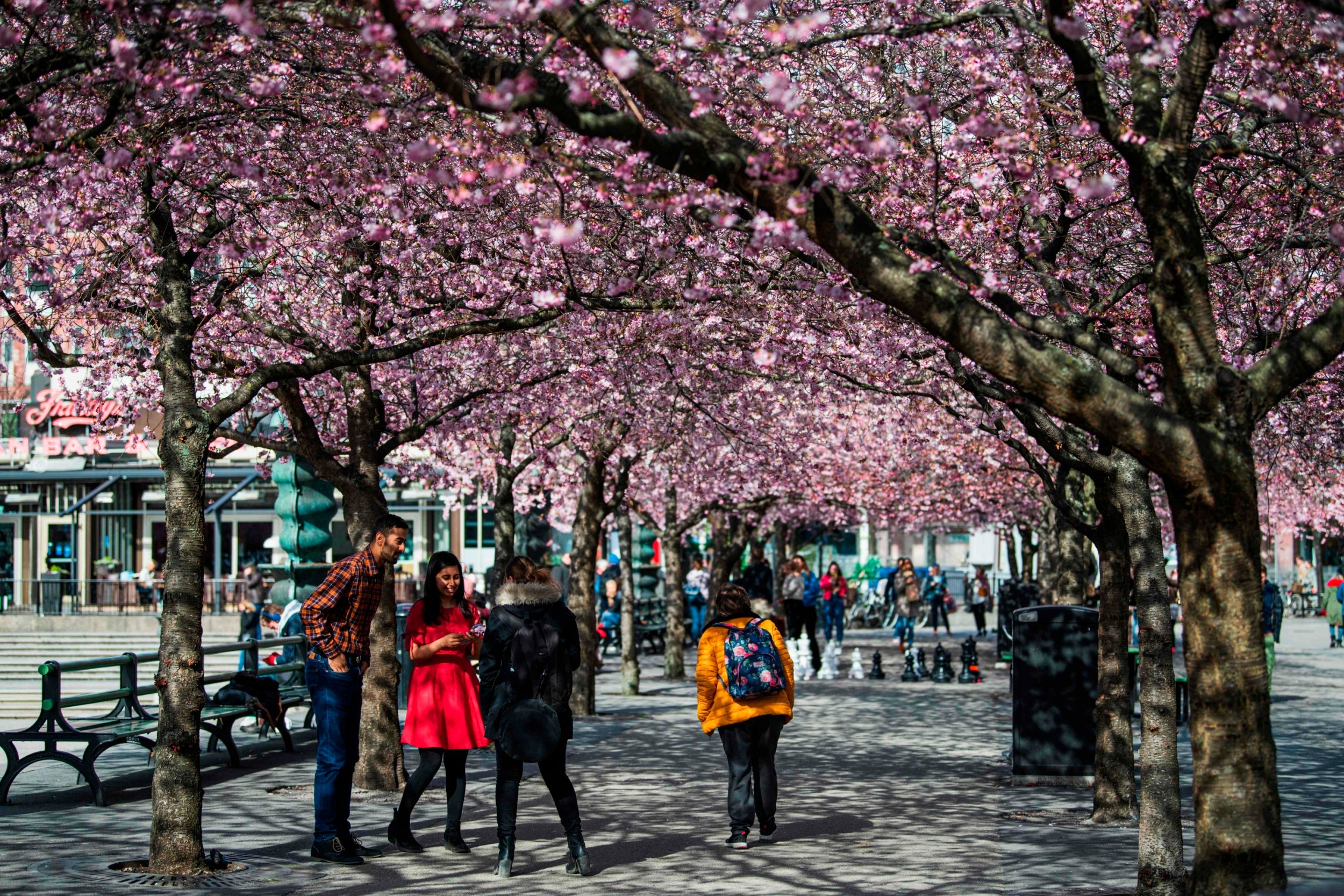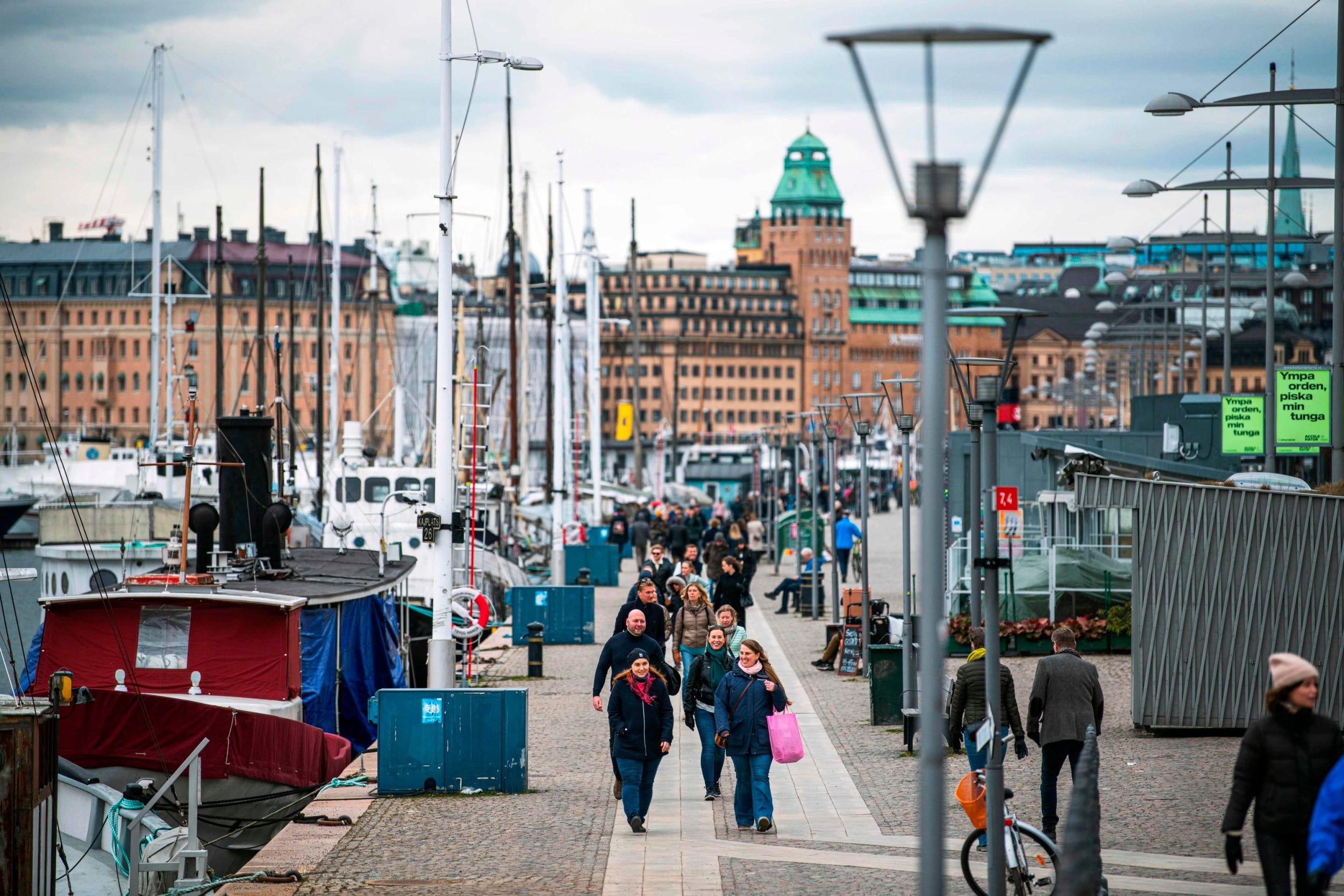Spring has come to Stockholm and, despite the chilliness, the sun is out and a small crowd gathers beneath the blossoming cherry trees of Kungsträdgården, one of the most popular parks in the Swedish capital.
Teenagers grin and take selfies. In the nearby cafes, people are bowed over laptops. Others drink coffee outside with friends and discuss Easter holiday plans. There is an air of calm and normality... in stark contrast to the panic sweeping the rest of Europe with the spread of Covid-19.
Among the patrons of one cafe is Ludvig Jansson, a 38-year-old developer, whose entire company is now working remotely. “I have colleagues who are staying home but I think if you can, you should go support cafes and restaurants as long as possible,” he says. “When the government says so, I will definitely stay home.”
Sweden’s approach thus far has been laissez-faire in comparison even with Nordic neighbours such as Denmark, which has restricted meetings to 10 or fewer people and ordered the closure of most public spaces. It's also closed its borders to all but essential travellers.
In Sweden meanwhile, it is largely business as usual, with most schools open and meetings of up to 50 people permitted. Cafes and restaurants can remain open as long as they serve only seated customers and space out the tables. Many companies like Jansson’s are opting to work remotely as part of government recommendations, but are not obliged to.
“Basically, the Swedish authorities are putting a lot of responsibility on the citizens,” Dr Emma Frans, an epidemiologist working in Karolinska Institute, tells The Independent.
“So now our strategy is to isolate the elderly who are the highest risk and not stop the spread, but slow it down and flatten the curve so the healthcare system doesn’t collapse.”
Those over 70, or with pre-existing health conditions, have been asked to stay at home except for a daily walk. Visits to elderly care homes have been limited.
Dr Frans says: “I think this is how this pandemic should be dealt with in a democracy, depending on people’s common sense, but unfortunately not everyone is acting responsibly.”
She is not the only expert in Sweden expressing concern about how the country is dealing with the virus. A group of 2,000 doctors, scientists, and public health specialists recently penned a letter to the authorities urging them to take stronger action.
Daily coronavirus briefing
No hype, just the advice and analysis you need
“We want to urge the government and the authorities to follow the recommendations that exist internationally, which the WHO has agreed with and which most countries follow.”
One of the signatories of the letter, Dr Olle Kämpe, an immunologist at Karolinska, told state wire service TT: “I get the feeling that they want to spread the infection to gain herd immunity but it’s pretty cynical because it will be at the price of hundreds, if not thousands of lives.”
But prime minister Stefan Löfven has said the responsibility lies with the individual.
“We who are adults need to be exactly that: adults. Not spread panic or rumours,” he said in a televised address last weekend.
“No one is alone in this crisis, but each person has a heavy responsibility.”
While this approach may seem strange to outsiders, Dr Lars Trägårdh, social historian and co-author of the book Are Swedes human beings?, says: “Sweden is a high trust society in comparison with the UK, trust between people here is at around 67 per cent while in the UK it’s 35 per cent and that translates into both trust in our institutions and the institutions trusting the citizens and citizens trusting each other.
“Trust is the opposite of control, so you create a space of freedom, but freedom with responsibility.”
This over-emphasis on trust, however, may prove dangerous due to authorities limiting testing to advanced cases, and the presence of asymptomatic carriers.
Sweden has so far reported more than 4,000 cases of the virus and over 140 deaths.
At a press conference, Sweden’s deputy state epidemiologist, Anders Wallensten, said: “Sweden’s strategy differs from that of other countries in Europe, like the UK and Germany, which have banned meetings of more than two people because several factors might be at play in different countries.”
One of the factors being taken into account is demography, since according to EU statistics more than half of Swedish households are made up of just one person, which could affect the infection rate.
This leaves populations who don’t fit into this group more vulnerable than others, with more Somali Swedes dying in Sweden than any other group. In Stockholm, one of the hardest-hit areas has been Jarva, where around 90 per cent of the population comes from an immigrant background. Authorities believe this was because the guidelines were not published in Somali and swiftly rectified it.
Somali-Swedish opinion writer Rashid Musa thinks this is a facile argument, saying: “This just enforces ideas that Somali Swedes are ignorant and illiterate, but the real issue is with those who disobey the government guidelines and go off to ski in the north and spread the virus.”
Many initial cases of Covid-19 in Sweden were people returning from skiing holidays in Italy.
Yet 78,000 tourists are still expected to visit the ski resorts in Jämtland and Härjedalen during the Easter holidays. Doctors in the tourist areas are now urging people to follow the advice of the health authorities and stay at home.
Among them is Sofia Leje, head of operations for three health centres in the Åre area who has been demanding that the ski resorts be closed, predicting a “healthcare disaster”. Danish prime minister Mette Frederiksen has warned against skiing in Sweden and has closed all resorts in Denmark.
“Vulnerable groups are forced to adhere to recommendations that are actually adapted to a white middle class,” writer Musa adds.
“Not everyone is able to work from home from their computer. Not everyone has the opportunity to sit in self-quarantine in their summer house.”
Nancy Barakat, 36, is the owner of a jaunty yellow food truck which sometimes stops in Kungsträdgården, and like many small business owners she has seen a drop in the number of customers. She says: “I feel like I’m taking a big health risk every day taking out the truck, but I have no choice, there are bills to pay and am not sure what to do.”
She adds anxiously: “I hope we can survive both the virus and what happens financially.”




No comments:
Post a Comment